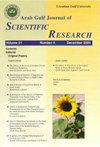Medical students' perceptions of introducing medical terms in Arabic within a curriculum taught in English: a descriptive study
Q4 Business, Management and Accounting
引用次数: 0
Abstract
Purpose All colleges of medicine in the Gulf Cooperation Council (GCC) adopt English as a language of instructions. This study aimed to examine medical students' views on introducing medical terminology in Arabic within an English-based curriculum. Design/methodology/approach This descriptive study targeted preclinical second- and fourth-year students in the College of Medicine and Medical Sciences at the Arabian Gulf University, during the academic year 2022–2023 (n = 407). Within the pharmacology teaching material in unit I (second year) and unit VIII (fourth year), which are taught in English, students were provided with medical terms in Arabic. At the end of these two units, students' views were sought by using a self-administered questionnaire. Findings The number of respondents was 263 (response rate 64.1%: 22.2% males, 77.8% females). Most participants received their school education mainly in Arabic (78.8%). A significant percentage of students believed that providing Arabic terms helped their learning (79.8%). If pharmacology is taught exclusively in English, majority of the students anticipated to face difficulties when explaining drug treatment to their patients in the future (71.3%). Most respondents expected this intervention to help them communicate with patients (86.7%), and preferred to include it in the clinical skills training (82.2%). The second-year students and those whose school education was mainly in Arabic were more likely to agree to the intervention ( p < 0.05 for both). Originality/value The introduction of medical terms in Arabic is an acceptable alternative to complete Arabization, and is believed to help students in their learning and communication with their patients.医学生对在英语授课课程中引入阿拉伯语医学术语的看法:一项描述性研究
海湾合作委员会(GCC)的所有医学院都采用英语作为教学语言。本研究旨在探讨医学生对在以英语为基础的课程中引入阿拉伯语医学术语的看法。本描述性研究以2022-2023学年阿拉伯湾大学医学与医学科学学院临床前二年级和四年级学生为研究对象(n = 407)。在以英语授课的第一单元(二年级)和第八单元(四年级)的药理学教材中,向学生提供阿拉伯文的医学术语。在这两个单元结束时,学生们通过使用自我管理的问卷来征求意见。结果调查对象263人,回复率64.1%,其中男性22.2%,女性77.8%。大多数参与者主要以阿拉伯语接受学校教育(78.8%)。很大比例的学生认为提供阿拉伯语术语有助于他们的学习(79.8%)。如果药理学完全用英语授课,大多数学生预计将来在向患者解释药物治疗时会遇到困难(71.3%)。大多数受访者(86.7%)希望这种干预能帮助他们与患者沟通,并倾向于将其纳入临床技能培训(82.2%)。二年级学生和学校教育以阿拉伯语为主的学生更有可能同意干预(p <两者均为0.05)。引进阿拉伯语医学术语是完全阿拉伯化的一种可接受的替代方法,据信有助于学生的学习和与病人的交流。
本文章由计算机程序翻译,如有差异,请以英文原文为准。
求助全文
约1分钟内获得全文
求助全文
来源期刊

Arab Gulf Journal of Scientific Research
综合性期刊-综合性期刊
CiteScore
1.00
自引率
0.00%
发文量
0
审稿时长
>12 weeks
期刊介绍:
Information not localized
 求助内容:
求助内容: 应助结果提醒方式:
应助结果提醒方式:


